After leaving the European Union, many British exporters found themselves in a new reality: the familiar CE marking no longer opens doors to most foreign markets, and the national UKCA system is not yet recognized abroad.
In this new competitive environment, UK companies are exploring alternative export destinations — and the Middle East (GCC: Saudi Arabia, UAE, Qatar, Kuwait, Bahrain, and Oman) has become one of the most promising regions.
However, access to these markets is only possible through compliance with local certification systems, such as SASO, ESMA, and G-Mark.
Key Certification Systems in GCC Countries
SASO (Saudi Standards, Metrology and Quality Organization)Mandatory certification system for all goods supplied to Saudi Arabia.
Operates through the SABER platform, where each product and shipment is registered.
SASO is required for:
- Electrical and electronic equipment
- Building materials
- Cables and metal structures
- Automotive parts
- Textiles and consumer goods
Documentation required:
- Test reports (IEC / ISO)
- Technical files and manuals in Arabic
- Manufacturer’s ISO certificates
Validity: 1 year; each shipment must obtain a Shipment Certificate.
ESMA (Emirates Authority for Standardization and Metrology)National certification authority of the UAE, overseeing quality and safety standards.
ESMA Certification Schemes:
- ECAS – mandatory certification for electronics, cosmetics, construction materials, packaging.
- EQM (Emirates Quality Mark) – quality mark confirming compliance with ESMA and international standards.
Typical Mistakes Made by UK Exporters
- Trying to use UKCA marking without adapting to local standards.
- Lack of a local representative in GCC countries (required for SASO/ESMA).
- Missing Arabic translations of technical documentation.
- Errors in labeling or packaging (non-compliance with GSO standards).
- Missing or outdated ISO certificates for production processes.
How to Prepare for Certification
- Identify your target markets and product categories (e.g. SASO – Saudi Arabia, ESMA – UAE).
- Conduct an audit of technical documents: tests, CE/UKCA, ISO.
- Appoint a local representative (Importer of Record).
- Choose an accredited certification body recognized by GSO or SASO.
- Translate documentation into Arabic.
- Plan 6–10 weeks for the entire certification process.
Conclusion
The post-Brexit landscape demands a new export strategy from UK companies.International certification is not just a formality — it’s a key tool of global competitiveness.
Obtaining SASO, ESMA, and G-Mark certification allows British manufacturers to officially sell in Middle Eastern markets, participate in large infrastructure projects, and strengthen their global presence.
WorldWideBridge supports British companies through all certification stages — from preparing documentation to registration and obtaining SASO, ESMA, and G-Mark certificates.
We help adapt CE and UKCA to international requirements and ensure quick, legal, and effective market entry into the GCC region.
